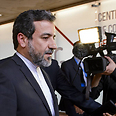
Iran: Nuclear plan 'backed' by 6 world powers
Islamic republic's chief nuclear negotiator, says six world powers have accepted Tehran's plan to cap some of the country's atomic activities in exchange for selective relief from economic sanctions
The upbeat comments from Abbas Araghchi, reported by Iranian state TV, suggest that negotiators in Geneva are moving from broad discussions over a nuclear deal to specific steps limiting Tehran's ability to make atomic weapons. In return, Iran would start getting relief from sanctions that have hit its economy hard.
Related stories:
- US proposes 6-month freeze for Iran's nuclear program
- Report: Rohani not 'optimistic' about nuclear talks
"Today, they clearly said that they accept the proposed framework by Iran," Araghchi said.
Though he described the negotiations as "very difficult," he said he expected agreement on details by Friday, the last scheduled round of the current talks.
The White House said on Thursday that In exchange for "concrete, verifiable measures" to address long-standing international concerns, the six powers "would consider limited, targeted, and reversible relief that does not affect our core sanctions architecture." told reporters at a briefing.
If Iran failed to show progress on its nuclear program, the "moderate" sanctions relief could be reversed, and stiffer sanctions could be imposed, White House spokesman Jay Carney said .
The US State Department stated that the US and Iranian delegations held a "substantive and serious" meeting on the sidelines of the Geneva talks on Thursday, in the presense of Araghchi and Under Secretary of State Wendy Sherman.
The last round of talks three weeks ago reached agreement on a framework of possible discussion points. The two sides kicked off Thursday's round focused on getting to a "first step" – described by Western negotiators as an initial curb on uranium enrichment and other activities.
Though Tehran says it needs to do this work for peaceful purposes, the United States and its allies fear that Iran could turn it to use to arm warheads with fissile material.
The initial encounter broke about an hour after it began, possibly to allow consideration of ideas presented by the two sides. European Union spokesman Michael Mann called it a "good opening session."
Before the talks, Iranian Foreign Minister Mohammad Javad Zarif met with top EU diplomat Catherine Ashton, who is convening the meeting. He said the two agreed to meet again in the afternoon.
Asked afterward about the chances of agreement on initial steps this week, Zarif told reporters: "If everyone tries their best, we may have one."
After nearly a decade of deadlock, Iran seems more amenable to making concessions to the six countries. Iran's new president, Hassan Rohani, has indicated he could cut back on the nuclear program in exchange for an easing of sanctions.
Despite the seemingly calmer political backdrop, issues remain.
Iranian hard-liners, for example, want significant sanctions reductions in exchange for scaling back enrichment, while some US lawmakers want the enrichment to stop altogether in exchange for loosening the sanctions.
Officials from two of the delegations said the sanctions relief on offer at this meeting will be limited and is unlikely to affect the core sanctions on Iran's oil and finance sectors unless Tehran makes sweeping concessions, which is thought to be unlikely.
One negotiating point is expected to center on Iran's production of uranium enriched to 20% – a level that is only a technical step short of weapons grade material. Iranian officials have hinted they are ready to discuss Western demands both for a production stop and of turning stockpiles into a form that is difficult to use for nuclear arms.
Though that would not, in itself, be sufficient to ease oil and finance sanctions, diplomats have previously said initial sanctions rollbacks could free Iranian funds in overseas accounts, and allow trade in gold and petrochemicals.
The negotiators might also test Iran's commitment by waiting – possibly for as long as six months – after an agreement before applying sanctions relief. And the sanctions could be easily reapplied should Iran renege on commitments it makes in Geneva.
The officials demanded anonymity as the condition for discussing details of the closed negotiations.
Prime Minister Benjamin Netanyahu addressed the Iranian nuclear talks in Geneva on Thursday and said, "Israel rejects the compromise proposals that have come up in the talks in Geneva. Accepting them will be a historic mistake that would allow Iran to continue to develop its nuclear program."
At a conference in Jerusalem he added, "The proposals in Geneva weaken the pressure on Iran. Its (Iran’s) concessions are not concessions."
- Receive Ynetnews updates directly to your desktop










